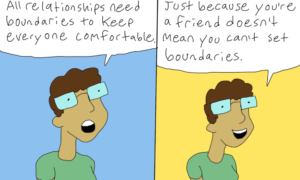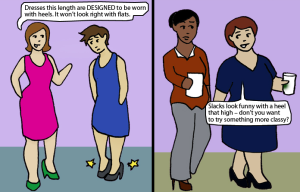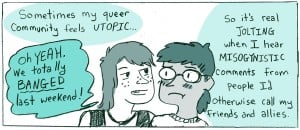When people find out that I’m polyamorous and that I prefer to date multiple partners with everyone’s knowledge and consent, I get a variety of responses.
Some express strong disapproval or even disgust. I’ve been told that I clearly don’t love any of my partners, that I’m stringing them along or manipulating them or cheating on them, that what I’m doing is against nature and a sign of sickness.
Thankfully, though, most people are totally cool with it. They know other polyamorous people, or maybe they’re even polyamorous themselves. They might say things like “I’m not polyamorous, but good for you!” or “That sounds like fun, but I’ve got my hands full with one.”
But there are some people who fall somewhere between those ends of the spectrum when it comes to accepting that polyamory is a valid way to do relationships.
They may not think I’m doing anything morally wrong, but they’re skeptical. They ask questions that make it clear that they don’t really understand what polyamory is about. If I were talking about marginalized identities, I might refer to their comments as microaggressions.
While we should not conflate being polyamorous with being queer or a person of color, it’s true that polyamory is a misunderstood and stigmatized relationship style.
Polyamorous people end up hearing the same types of responses over and over, and it can be exhausting to defend our relationships and preferences.
Here are 15 assumptive statements people say to non-monogamous people and why they are misguided and hurtful.
1. ‘That Could Never Work’
Often accompanied by an anecdote about a friend who tried polyamory and totally hated it, this comment seems like a well-intentioned statement of opinion, but it’s actually very invalidating.
How can you claim that polyamory “doesn’t work” when speaking to someone like me, who’s been happily polyamorous for three years? Am I wrong about my own perception that my relationships have largely been healthy and successful? Am I actually miserable and just don’t realize it?
Statements like these are problematic because they stem from faulty assumptions that go far beyond polyamory.
Telling someone that they’re wrong about their own feelings causes them to doubt themselves and their boundaries and preferences. For example, queer people often hear that they’re “actually” straight, and people seeking abortions are often told that deep down they must want to have the baby.
Whether you’re telling someone that they actually like something they say they don’t like or vice versa, you’re saying that you know better than them what their own experience is.
That’s just not true – in fact, it can become gaslighting, which is a tactic of abuse and control.
2. ‘You Must Have a Lot of Sex’
Just like monogamous people, polyamorous people have varying levels of interest in sex.
Some are on the asexual spectrum. Some have illnesses or disabilities that impact their desire or ability to have sex (or their partners do). Some choose to implement rules that limit what they can do sexually with some of their partners. Some are single.
The fact that someone is polyamorous says nothing about how much or what types of sex they have.
The idea that polyamory is all about sex sex sex is often used to discredit it as a valid relationship style or portray polyamorous people as “slutty” or noncommittal.
There’s nothing wrong with having lots and lots of consensual sex with lots and lots of people, but it’s not the whole story about polyamory.
3. ‘So Which One Is Your Main Partner?’
Some people do choose to have a “main” or primary partner with whom they share certain responsibilities and have more interdependence. But others don’t.
To them, this question is hurtful because it’s a reminder that many people still believe that you can only have one partner who really “matters.”
But in fact, there are many ways to practice polyamory that don’t involve having a “primary,” such as solo polyamory and other radical alternatives.
This question comes from the idea that there always has to be one “main” relationship in someone’s life, which is a view that’s very centered on monogamy.
Of course, it’s okay to do relationships that way whether you’re monogamous or polyamorous. What’s not okay is assuming that’s the only way relationships can work.
If you’re curious about how someone sets up their relationships, you can instead ask them, “How do you structure your relationships?”
That lets them tell you about how they do things, rather than having to respond to your possibly-mistaken assumptions about how they do things.
4. ‘Well, My Partner Is Enough for Me’
If you feel happy and fulfilled with one partner, that’s great! But the way this statement is worded implies that polyamorous people think that one partner isn’t “enough.”
Maybe some feel that way, but for most of us, it’s not about collecting some magic number of partners; it’s about being able to pursue relationships with more than one person.
When I flirt with a cute new friend, it’s not because the partners I already have are inadequate or insufficient for me. It’s because flirting with cute new friends is fun, and I want to see where things go, and my other partners think that’s great.
If I’m only interested in one person at the moment, well, then one partner will be “enough!” But we’d still be in an open relationship, because someday we may become interested in someone else.
5. ‘Oh, You’ll Find The One Someday’
This is similar to telling a lesbian that she’ll meet the right man someday, or telling an atheist that they’ll come around and believe in god eventually.
While individuals’ needs, preferences, and identities can shift over time, it’s patronizing to assume that you know how they’ll shift, if they even will.
For polyamorous people who do transition to monogamy, it’s usually not a matter of meeting “the right person,” but of changing needs and desires, compromise, safety concerns, time management, or any number of other factors you can’t possibly presume to know.
6. ‘You Just Want to Have Your Cake and Eat It, Too’
Statements like these reveal some resentment towards those who practice consensual nonmonogamy.
When we say that someone is trying to have their cake and eat it too, we usually mean that they want all the advantages of something without the responsibilities that come with it, or that they want two mutually exclusive things and refuse to choose between them.
But that’s not how relationships work.
Being in a committed relationship with someone is not mutually exclusive with dating someone else, as long as everyone consents.
Polyamorous people are not trying to avoid responsibilities or commitments. In fact, ethical polyamorous relationships can take quite a bit of work and communication.
7. ‘But What About Kids?’
Polyamorous women (or people who are perceived as women) are often asked this question. Men seem to get it much less often because they are not expected to plan their lives around raising children.
Some people, including some polyamorous people, are not interested in having children. Asking someone “But what about kids?” is presumptive.
Moreover, the question suggests that polyamory and parenting are incompatible.
Many polyamorous people do raise children with one or more of their partners.
While this certainly comes with its challenges, polyamory does not necessarily mean an unstable or inappropriate environment for children.
And, as any child of divorce knows, monogamy is no guarantee of anything.
If you’re interested to know how a polyamorous friend sees their future, ask them.
It might also be okay to ask them if they’re hoping to have children some day, but remember: If you’re not close enough with this person for it to be okay to ask that question if they weren’t polyamorous, then it’s not okay to ask it just because they are.
8. ‘You’re Polyamorous So You Can Have Both Genders, Right?’
Polyamorous bisexual/pansexual people often face this stereotype.
There’s a harmful myth about bi/pan people that they can’t ever be happy with just one partner because they “need both genders.” Some gay, lesbian, and straight people even refuse to date bi/pan people because they assume they’ll get cheated on.
It’s important to note that these comments, which tend to reference “both” genders, are often phrased in a way that excludes nonbinary gender and agender people.
For that reason, these comments harm people who are bi/pan, people who are nonbinary and agender, and people who are both.
For most bi/pan people, this isn’t how it works.
If you find both redheads and brunettes attractive, does that mean you always need to be dating at least one of each? Probably not. For many bi/pan people, gender isn’t that relevant, and if they choose to be polyamorous, it probably isn’t simply because they’re attracted to people of multiple genders.
That said, there are bi/pan people whose attraction to multiple genders does influence their decision to be polyamorous. That’s valid, too. It just shouldn’t be an assumption.
If you’re wondering why someone is polyamorous, just ask them directly: “What made you decide to be polyamorous?” “How did you get into polyamory?”
Instead of making statements that assume why the person is polyamorous, ask them why they decided to be.
9. ‘I’d Never Let My Partner Do That’ (Or ‘Wow, Your Partner Lets You Do That?’)
A partner is not a child.
You can’t “let” or “not let” another adult do something unless it involves your own boundaries.
Polyamorous people don’t “let” their partners have other partners; they agree, together, that they’d like to be in an open relationship.
Likewise, monogamous couples can mutually decide that monogamy is best for them.
It shouldn’t be a matter of one person not “letting” the other have the types of relationships they want in their life, although compromises can obviously happen.
If a couple cannot agree on whether or not their relationship should be open, it may be best for them to part ways rather than treat monogamy as a default that never needs to be discussed.
10. ‘Your Partner Just Wants to Take Advantage of You’
It’s valid to worry about someone you care about. Abuse can happen in any relationship. But suggesting that someone is being manipulated or taken advantage of simply because their partner has other partners denies their agency.
But polyamory is not cheating.
This comment is usually made to women who date men and seems to come from the stereotype that men always want to cheat on their girlfriends or wives and feel entitled to multiple partners (with or without everyone’s knowledge of consent).
Viewed with this frame, polyamory seems like just another way for men to cheat, except without even having to feel guilty.
Obviously, misogyny can play a role in polyamorous relationships just like it can in monogamous ones. Some people do feel pressured by a partner to try polyamory. That doesn’t mean people can’t willingly choose polyamory.
Many of us not only want more than one partner for ourselves, but actually want our partners to have that option, too.
Polyamorous people even have a word for feeling joy at the idea of a partner being happy with another partner: compersion.
11. ‘Oh, So You’re Available!’
I don’t like the word “available” in the context of sex and dating. It’s usually used to refer to someone who’s not in a relationship that precludes them dating or hooking up with someone else, and as a euphemism for the word “single.”
But in every other context we use that word, it means that the person is basically able and willing to do what’s being discussed.
Polyamorous people are not necessarily “available” to you.
They may be in closed relationships consisting of more than two people (this is known as polyfidelity). They may have rules with their partners about seeing new people. Or they may just not be interested in you.
If you’re interested in someone who happens to be polyamorous, do the same thing you’d do with anyone else: Ask them if they’d like to go out with you.
If they don’t want to, or can’t because of their relationship structure, they’ll let you know.
12. ‘Sounds Like the Polyamorous Thing Didn’t Work Out After All’
When polyamorous people have relationship troubles or go through breakups, others often take it as a sign that polyamory just doesn’t work.
But like monogamous relationships, open relationships can end for all sorts of reasons.
They are strained by many of the same issues: financial problems, mismatched schedules or communication styles, shifting needs and interests, or simply falling out of love.
I’ve gone through several breakups since becoming polyamorous, and none of them were caused by being polyamorous. They were caused by not wanting to be in a relationship with that person anymore.
When people in monogamous relationships break up because they fell for someone else and had to “choose,” nobody says, “Well, looks like that monogamy thing just doesn’t work!”
That’s because monogamy is the default, and when it seems not to be working well for a particular person, we tend to assume that the problem is with the person, not with monogamy.
In reality, different relationship styles will work for different people. If you hate polyamory, yes, your polyamorous relationships will not be very happy or healthy for you.
13. ‘But Don’t Your Partners Get Sad When You’re On Dates With Someone Else?’
This is a subtle way of suggesting that the polyamorous person you’re speaking to doesn’t care about their partner’s feelings.
The implication is that everyone would experience their partner being on a date with someone else as an unpleasant thing, and that it’s always your responsibility to prevent your partner from feeling sad about things that you do.
Of course, it’s generally a good idea to be mindful of how your actions impact your partners, emotionally and otherwise.
But that someone else is sad about something you’re doing doesn’t necessarily mean you’re doing something wrong.
In fact, many people in polyamorous relationships will be open with their partners about these negative feelings, but will reaffirm that they want their partners to go out and be happy. Other times, someone may choose to stay home and comfort a partner instead.
As with most of these things, similar dynamics happen in monogamous relationships all the time.
Have you ever stayed in instead of going out with friends because your partner had a really rough day and wanted some support? Have you ever texted a lonely partner while you were away on a business trip so that they wouldn’t miss you as badly?
All relationships require balancing your own needs with those of your partner. It’s rarely easy, but it’s possible, even in polyamorous relationships.
14. ‘Why Do You Have to Talk About Polyamory All the Time?’
The short answer is because of everything I’ve just written about.
We have to talk about polyamory because it actually hasn’t been talked about nearly enough. The frequency with which we hear these misguided comments and questions makes that clear.
The idea that polyamorous people talk about polyamory too much misses a few points.
First of all, most people talk about their interests a lot, whether that’s tabletop gaming or craft beer or Star Trek. For some polyamorous people, polyamory is in itself an interest of theirs; for others, it isn’t.
Second, polyamorous people talk about polyamory because we’re still figuring it out ourselves.
There are few scripts for this in our culture, and it’s important to us that we get it right. Part of the reason many of us chose polyamory to begin with was because we felt that not talking openly about our needs in relationships was destroying them. Some of us found ourselves miserable in relationships that were monogamous by default.
That defaulting of monogamy is exactly why it often feels like polyamory gets talked about so much.
Monogamy doesn’t have to be talked about. When people discuss the agonies of choosing between two potential partners that they’re interested in or their hopes of soon meeting The One, nobody asks them to explain that weird monogamy thing.
When people talk about how to prevent yourself from developing feelings for someone other than your (monogamous) partner, or about how to tell if your partner’s cheating on you, nobody says, “Why do you have to talk about monogamy all the time?”
And yet, they’re talking about monogamy.
15. ‘But Don’t You Get Jealous?’
Vegetarians and vegans sometimes talk about how frustrating it is to be asked, “But what about bacon?”
The jealousy question is the what-about-bacon of polyamory. People assume it’s some sort of trump card – if you get jealous, clearly, polyamory is impossible, and everyone gets jealous.
In fact, some people really don’t. Others do experience jealousy, but have decided that polyamory is what’s best for them anyway.
Jealousy happens all the time in monogamous relationships – you might be jealous of a partner’s friendships, job, family, talents, or basically anything else they have that you wish you had too. You might feel insecure when they spend time with their friends. You might worry that they love their work or their hobbies more than they love you.
But you (hopefully) wouldn’t conclude that your partner should stop having friends or relatives or hobbies.
Likewise, many people treat jealousy as something to be worked through and coped with, because for them, being polyamorous is worth it.
***
Rather than making comments like these, consider taking the opportunity to learn more about polyamory and about your polyamorous friends.
Learning about polyamory doesn’t mean you have to try it or prefer it for yourself. It’s just a good way to be more supportive of your polyamorous friends and to know more about all the weird and wonderful ways people do relationships.
If you want to learn more, More Than Two is an incredible resource. Your polyamorous friends might be able to recommend books and blogs they like, too.
There are as many ways to be polyamorous as there are polyamorous people, and even if you’ve chosen monogamy, you can pick up some helpful relationship skills from them – or at least hear some great stories.
[do_widget id=’text-101′]
Miri Mogilevsky recently graduated with a Masters in Social Work and is starting a career as a counselor in Columbus, Ohio. She loves reading, writing, and learning about psychology, social justice, and sexuality, and is working on her cat photography skills. Miri writes a blog called Brute Reason, rants on Tumblr, and occasionally even tweets @sondosia.
Search our 3000+ articles!
Read our articles about:
Our online racial justice training
Used by hundreds of universities, non-profits, and businesses.
Click to learn more





















